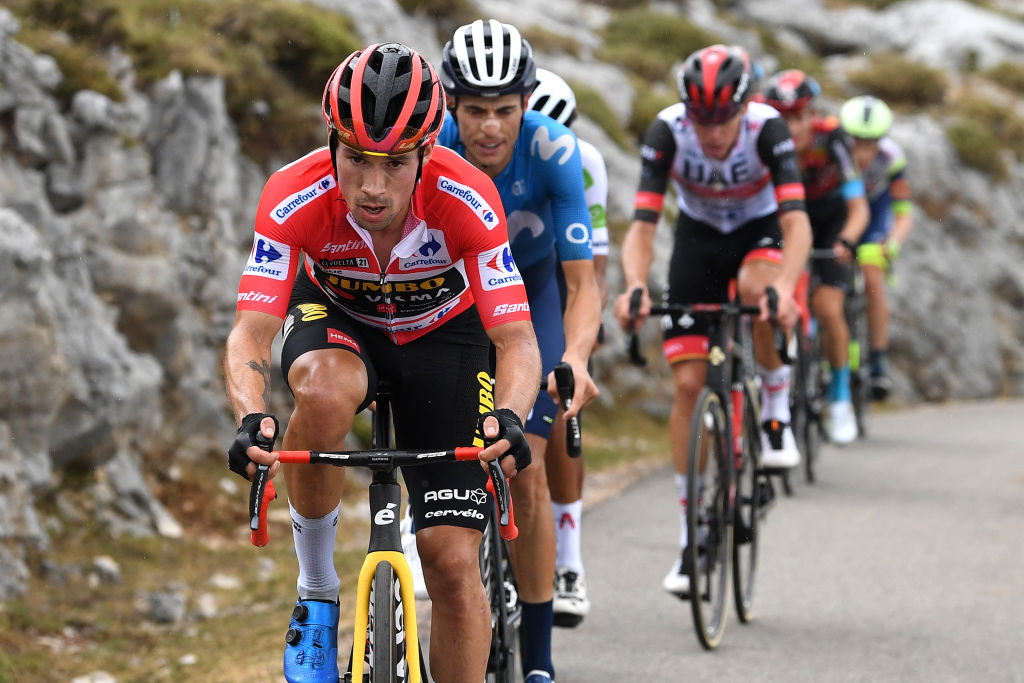
The stakes are high for Primož Roglič in this year’s Vuelta a España. The Slovenian arrives at the race after fracturing his back in a crash at the Tour de France, and the pain from his heavy fall in July still lingers.
Purely in terms of records, a fourth overall victory would put the 34-year-old on a level footing with the most successful ever Vuelta rider Roberto Heras, who won his home Grand Tour in 2000, 2003, 2004 and 2005.
However, Grand Tour success rarely comes easily to Roglič, and a triumph in the 2024 Vuelta would be no exception to that rule. No one doubts the former ski jumper’s huge talent on two wheels. But there are plenty of question marks surrounding the Red Bull-Bora-Hansgrohe leader’s ability to perform at his maximum following his Tour injury.
Yet at least until events on the road prove otherwise - and Saturday’s opening time trial will provide the first real clue regarding his condition - Roglič remains the key reference point for all the Vuelta contenders for now.
With that in mind, Cyclingnews has run the rule over Roglič’s pathway to being the most successful Vuelta a Esapaña rider in the current peloton - and why, after Roglič’s victories in Spain in 2019, 2020 and 2021, Tadej Pogačar might not be the only Slovenian making Grand Tour history in 2024.
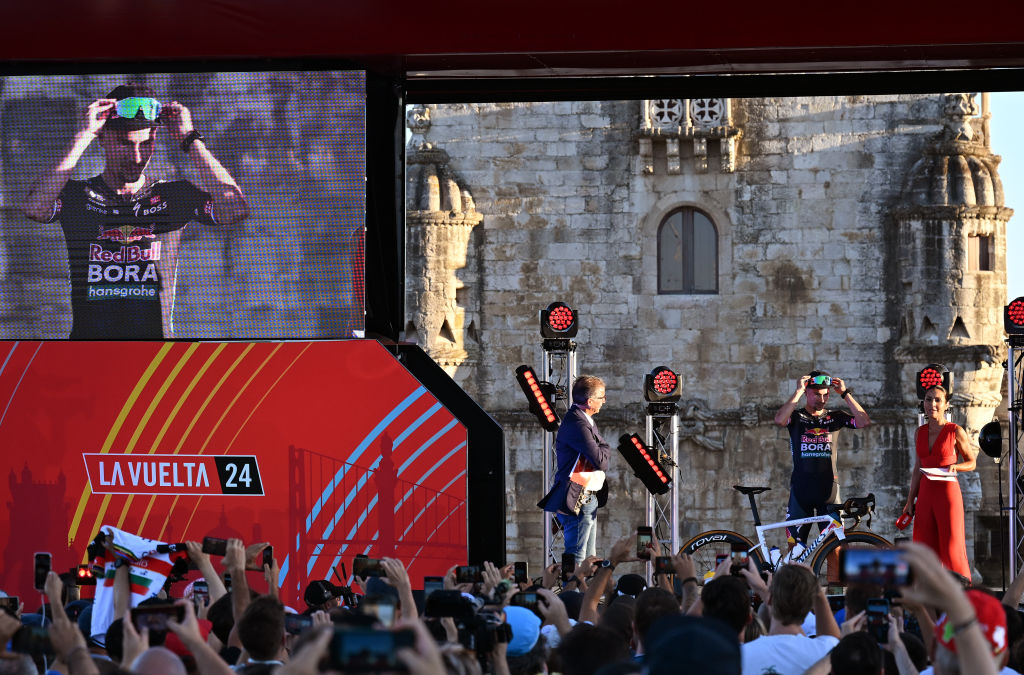
2019: A breakthrough win
When Cyclingnews interviewed Primoz Roglič a few days before the start of the 2019 Vuelta a España, sitting on a barstool in the sweltering hot school classroom that had been roped in by the organisation for pre-race chats, Roglič proved an even more laconic interviewee than usual.
But it was notable, too, that after a fourth place in the Tour in 2018 and a runner’s up spot in the 2019 Giro d’Italia, Roglic didn’t beat around the bush about his goals for his first ever Spanish Grand Tour. Sure, the guy might have been perched on a barstool when he talked: but he certainly wasn't in the mood for any kind of pub banter.
"I want to win and I'm going to try to win," Roglič, down as a co-leader for the Vuelta a España that year alongside teammates George Bennett and Steven Kruisjwijk: said categorically and simply when asked about his goals.
"The podium is a nice place, but I've already done that at the Giro. I want to fight as hard as possible to win.” However, he played down the idea that he was the top favourite for outright victory in 2019, simply saying: “Everybody starts from zero on Saturday.”
In Jumbo-Visma’s case, in fact, Roglič's then-team barely started the 2019 Vuelta's opening TTT before they found themselves heading to somewhere less than zero. Seemingly inconsequential in terms of its short distance through the streets of Torrevieja, halfway through the time trial no fewer than four of their riders were brought down by water gushing downhill, from - of all things - a burst children’s paddling pool situated a full 500 metres away.
The mystery of quite how such a small pool could wreak such liquid mayhem was never resolved. But in any case, the effect of the water spillage was what it was: Roglič and nominal co-leader Kruijswijk were two of the four riders to fall, alongside Neilson Powless and Lennard Hofstede. Although nobody was seriously injured, the whole team lost 40 seconds to winners Astana as a result.
'How I lost the Vuelta because of a leaking paddling pool' would have made for an interesting chapter title in any future hypothetical biography for Roglič. But in fact, the Slovenian subsequently managed to steady the ship in style with a relentless rise towards the upper reaches of the Vuelta GC.
Sixth place in the summit finish in the remote astronomy observation post at Javalambre, second in the ultra-steep Mas de la Costa inland in Valencia, and above all third place at the crunch, hail-lashed, Andorra stage of Cortals d’Encamp saw Roglič move into second overall behind Nairo Quintana by the Vuelta's first rest day.
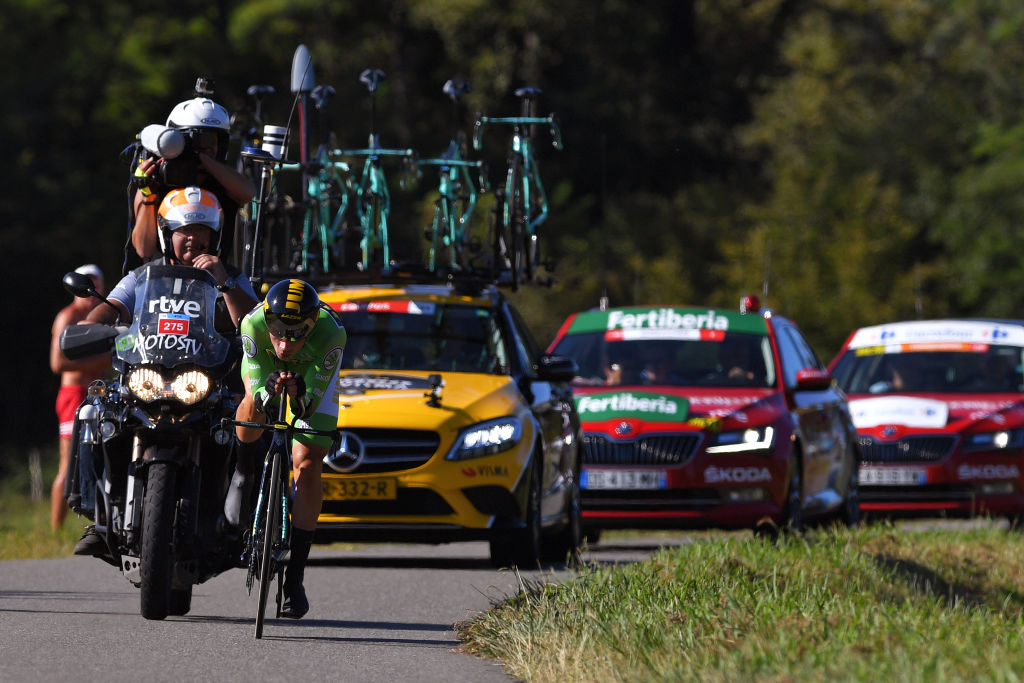
And from then on, the 2019 Vuelta belonged to Roglič. His knock-out first Vuelta stage win came in the time trial round Pau, France, a rolling affair rather than venturing into the nearby Pyrenees, but results-wise with the same effect as a lone attack to a summit finish. On stage 10 Slovenian not only pushed his closest GC opponent, one Tadej Pogačar, into a 1:30 deficit, but also knocked Quintana, the 2016 Vuelta winner out of the top spot overall by a mere 3:06.
Ascents as hard as the Machuchos and the Alto de Acebo - a regular feature of the Alto de Acebo - then came and went, but it was clear who was in command. The only real moments of doubt came in the form of surprise setbacks in the third week: first on the featureless flatlands around Guadalajara, when Soudal-QuickStep staged a mass attack and Quintana moved up to 2:24 overall, and then when Roglič was caught up in a crash just as Movistar were attacking on stage 19, However, perhaps the most dangerous of all came on the final major ascent of the race, the Plataforma de Gredos, where Pogačar unleashed a long-distance attack that forced Movistar, running second overall with an aging Alejandro Valverde, onto the defensive.
Had Pogačar's move been even more successful, it might - might - have seen him wrench the Vuelta lead from Roglič at the last. As it was, Movistar kept a lid on Pogačar, who had to settle for taking his third stage win of the race and booting Quintana off the Vuelta podium to claim third overall in Madrid. Meanwhile Roglič, terse and incommunicative as race leader to a point where one Spanish journalist snappily asked him directly, “Are you actually happy?” during a third week press conference, stayed out of trouble and ruled supreme all the way to Madrid.
As such, 2019 proved to be a Vuelta of firsts: Roglic's first Grand Tour win, the first ever for Slovenia, too, and the first Grand tour podium finish for Pogačar, standing as the rider to beat of the future out with three stage victories and third overall.
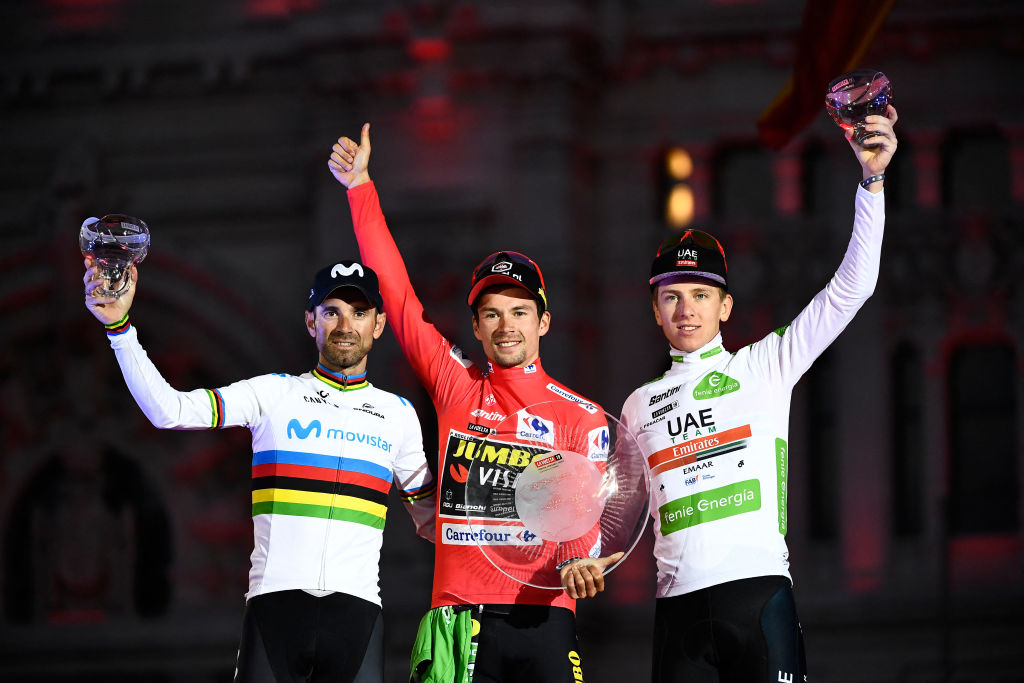
2020: The COVID-19 Vuelta a España
The pandemic could hardly be described as familiar territory for anybody, but one of the least expected effects was that it managed to create some hugely memorable Grand Tours. The last-minute drama began with Roglič being defeated by Pogačar in the Tour de France’s final TT and continued with Tao Geoghegan Hart seeing off Jai Hindley on the final day of the Giro d’Italia. As for the Vuelta, held in a chilly autumn across a Spain in the throes of a return to COVID-19 lockdown, the race witnessed Roglic claim his hardest fought of all three overall Vuelta victories to date.
By that point in the revamped cycling calendar, following his loss of yellow in the Tour, Roglič was on the hunt for sporting revenge. In a reduced version of the Vuelta due to international COVID-19 restrictions, the race skipped three planned initial stages in the Netherlands to start in the Basque Country with a summit finish on the legendary Mount Arrate. Roglič wasted no time in laying down a marker by sprinting to victory on the rainsoaked summit.
At that point, the Vuelta looked like a done deal for a second year running. Instead, the rider who finished just behind Roglič, 2019 Giro d’Italia Richard Carapaz, proved more than able to give the Slovenian a real run for his money.
The race turned out to be a real thriller, with Roglič and Carapaz going neck-and-neck in the next summit finish at Laguna Negra de Vinuesa on stage 4, only for Roglič to hit important trouble in the Pyrenean foothills on stage 6.
Caught behind after he opted to put on a rainjacket in increasingly rough weather at exactly the wrong moment, Jumbo-Visma managed to drag Roglič back to the main pack. As a result, on the constantly undulating approach roads to the long, grinding final ascent to Formigal, Jumbo found themselves seriously depleted in numbers to back their leader. So when Carapaz and Movistar piled on the pressure and split the peloton, neither the team nor their leader Roglič, caught behind, had a real answer.
History was not in Roglič’s favour either, as he found himself fighting for GC survival on the same climb where an ambush forged by Alberto Contador wrecked Chris Froome’s chances of victory in the 2016 Vuelta.
This time round, even if he was as isolated from his teammates as Froome five years previously, Roglič was able to limit the damage far better. But he still ended the day 43 seconds down on Carapaz - and out of the Vuelta lead. As Jumbo sports director Grischa Niermann put it with his characteristic bluntness afterwards, “We made a big mistake. But we still have the time trial in our favour.”
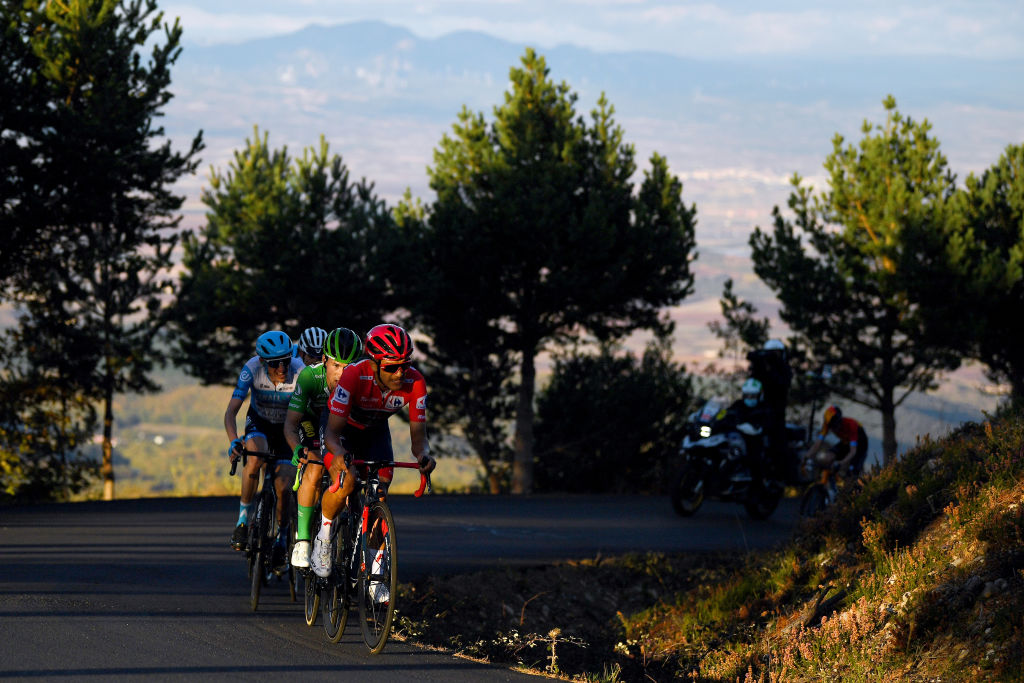
Roglič’s fightback began with a scintillating duel against Carapaz on the little-known but deeply punishing ascent of Moncalvillo in northern Spain, set to be revisited in this year’s Vuelta. Then, after a sneak attack on the seemingly inoffensive uphill finish to Suances gave Roglič a second 2020 Vuelta stage victory, the two found themselves tied on time on GC. However, better placings meant the lead teetered back into Roglič’s favour, only for Carapaz to then drop the Slovenian on the mythically steep Angliru, and return to the lead for a second time.
Neither rider seemed capable of shaking off the other, even if the opening third week time trial, culminating in an uphill finish at Ezaro in deepest rural Galicia, once again put Roglič back on top overall with a 40 second advantage on Carapaz. Yet that was far too narrow a gap for the Slovenian to be sure of success and on the exposed roads of the Alto de la Covatilla on stage 20, a last-minute drama came within a whisker of turning the tables in Carapaz's favour for good.
High on the empty, windswept plateau roads leading to the ski station of Covatilla, the Ecuadorian launched an all-out final attack. Isolated from his team again, Roglič looked to be in serious difficulties, only getting some temporary respite with backing from the one Jumbo rider in the break of the day, Lennard Hofstede. But then in an extraordinary development, the Slovenian was able to lock onto the back wheel of Movistar riders Enric Mas and Marc Soler, limiting the gaps. When he crossed the line, Roglič had held onto his lead by just 24 seconds on Carapaz, and with it, a second Vuelta a España was in the bag.
The backstory regarding Carapaz and Roglic’s unexpected 'helping hand' from a rival team rumbled on long after Roglič had celebrated another overall win in Spain - one in which his bonus seconds taken on stages, totalling 48 seconds played no small part.
Then there was the whole Covatilla question: people were quick to remember that Carapaz's exit from Movistar for Ineos at the end of 2019 had been anything but straightforward, given he was a late non-selection for the Vuelta lineup that year after racing a criterium without his team’s permission. Conspiracy theories thus abounded that he had been ‘punished’ by Movistar on the Covatilla, although officialy the team said their riders had been unaware that Roglič was on their wheel on stage 20.
Whatever the truth such rumours really held, Roglič had his name in the record books. He not only became the first rider to take two consecutive Vueltas since Roberto Heras (coincidentally from the town of Bejar at the foot of the Covatilla) took three in a row between 2003 and 2005. For the second year running, Roglič was also the only rider to secure podium finishes in two Grand Tours, and, after his Liège-Bastogne-Liège win, the first to take a Grand Tour and Monument in the same year since Laurent Jalabert won the Vuelta and Milan-San Remo in 1995.
Roglič’s second Vuelta was also, regrettably, special because it was a race with - and against - the pandemic. Although no riders tested positive in the Vuelta itself, COVID-19 was always been a troubling, constant presence, right down to the restrictions and confinements across Spain, and, of course, the lack of public on the big climbs. But finally, the Vuelta made it through.
“Getting this race to the finish is an achievement for each and every one of us. Everything went well. Everything worked,” Roglič said afterwards. “A big thanks to the organisation and everybody involved who made this possible. We can see in the world it’s a really bad situation but we still could do some racing and maybe produce some positive news at the end of the day.”
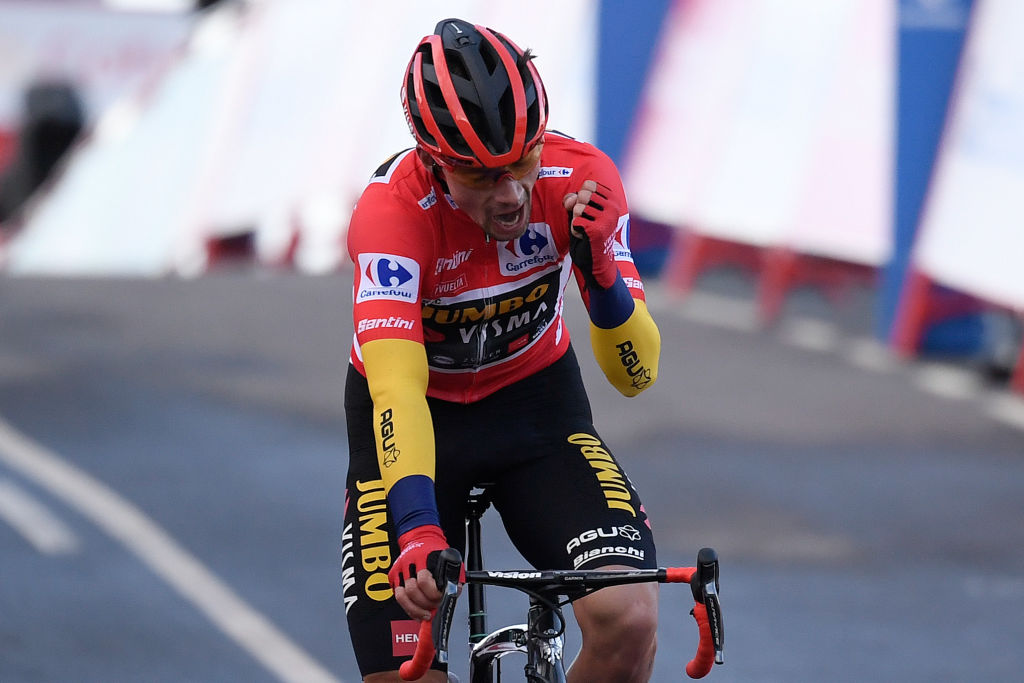
2021: Easier than ever
After all the nailbitingly close racing of 2020, Roglič’s third and most recent Vuelta a España victory was by far his most straightforward. A triumph in the opening time trial in front of Burgos cathedral meant that for the second year running, he started the Vuelta in the same way that he had ended the previous one - in the lead. From there, Roglič’s position simply got stronger and stronger.
Having briefly ‘loaned’ out the leader’s jersey to Rein Taaramae and, after a massive late crash, Kenny Elissonde in the first week, Roglič’s stunning ascent of the brutally steep ascent to Cullera in eastern Valencia allowed him to regain la roja once more. Second place on the interminable slopes of Velefique in the deserts of south-east Spain boosted his lead a little further, but where Roglič really began to crowbar the race in his favour was on a seemingly inoffensive cat. 2 climb on the opening stage of the second week.
Letting a large break up the road of non-GC threats ensured that he would be out of red, and irksome post-stage podium and media obligations for at least as far as the mountains of northern Spain. At the same time as he was playing one very predictable game, Roglič simultaneously tore up the script by attacking near the summit of the cat 2 Almachar climb and soloing away down the treacherous roads to the coastal finish town of Rincón de la Victoria.
While a crash halfway down the greasy, spiralling descent could have spelled curtains for Roglič’s GC bid, thankfully he could quickly remount and continue unscathed. The ensuing delay did mean Movistar GC duo Enric Mas and Miguel Angel Lopez could regain contact. But there was no such possibility of getting back in the game for Ineos challengers Egan Bernal and Adam Yates, already too far distanced when Roglič attacked. But more than the gaps what mattered above all, was the ease with which Roglič had extracted himself from the field in such unpromising terrain: face with such superiority, there was little hope for the rest.
The ways in which Roglič then alternated between demolishing the opposition and keeping them firmly under his thumb on each key stage continued to be as varied as it was entertaining - at least for the fans. There was his finely calculated outpowering of Enric Mas for a stage win at the ‘side-of-the-house’ finish at Valdepeñas de Jaén, Spain’s equivalent of the Mur de Huy.
Then there was the casual crushing of a move by the firebrand Miguel Angel Lopez at Pico Villuercas through the sierras de Guadalupe on stage 14 and the equally uneventful snuffing out of repeated digs by Adam Yates en route to El Barraco in the Sierras of Ávila on stage 15. There was his determined late charge at stage 18 to El Gamoniteuru in Asturias to knock out a few more seconds on all bar López. Then even as Lopez was seemingly seeking the most dramatic abandon from the race possible on stage 20, Roglič made the same last kilometre move again.
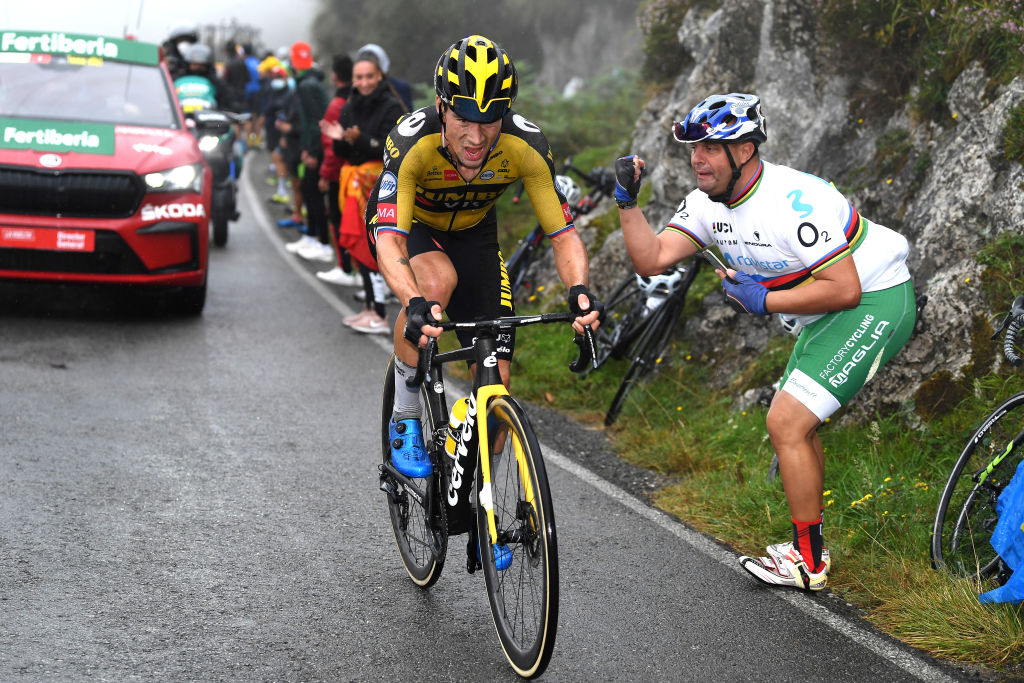
But the stage that confirmed what was already a virtual certainty came on the most emblematic climb of the entire Vuelta, to Lagos de Covadonga. After opting to follow a brave move Egan Bernal (Ineos Grenadiers) some 60 kilometres out, Roglič then shed the Colombian from his back wheel half way up the final ascent to go solo to the finish. Cycling legend always had it that whoever was in the Vuelta lead by the summit of Covadonga - a finish deep in the Picos de Europa, and home, too, to some of the last wolves in western Europe - would be in red come the overall finish of the Vuelta, too. And in Roglič's case, as he returned to the lead he had ‘loaned’ to the then Intermarché-Wanty-Gobert racer Christian Odd Eiking a week before, the legend seemed all but certain to become reality, again, particularly as a certain Sepp Kuss, then his teammate, placed second that day, 1:35 back.
Put simply, the opposition had been flattened once again. By the time the race reached Santiago de Compostela five days later, Roglič was more than home free in his bid for a third Vuelta a España win. He wrapped it up with a final time trial victory in the streets of the Galician capital too, ending the 2021 Vuelta exactly as it had began, with another TT win in front of a cathedral and with Roglič in red again.
While his final victory margin of 4:42 over Mas was the largest, too, in 24 years since Alex Zulle finished more than five minutes ahead of Fernando Escartin in 1997, by this point Roglič was racing against the history books. Victory number three meant he joined Tony Rominger, Alberto Contador and Robert Heras to conquer the Spanish Grand Tour as triple winners of the race.
"Hopefully the older you are, the happier you are,” he joked to reporters. “And I like this race, it gives me beautiful memories that I will have for my whole life.”
Quite apart from the statistics, what was equally impressive was that the Vuelta 2021 was yet another comeback after a major blow in the Tour de France. While 2020 had been largely to do with overcoming the mental impact of losing cycling’s biggest race in the last possible day, a year later the Vuelta was more about recovering from the physical fallout of a bad crash and subsequent injuries in the Tour. Either way, the final consequence was the same: Roglič was there, back in red again, in the Vuelta España
No sooner did he seem to be in a position to dominate the Vuelta for as long as h pleased than things turned awry. The 2022 Vuelta, though, could not have ended more differently for Roglič, culminating in a freak crash on the finish of a transition stage in the third week. Then in 2023, team tactics and a superb performance by Sepp Kuss prevented him once again from opting to try for a fourth record-equalling title.
What the 2024 Vuelta will bring for Roglič - and his rivals - very much remains to be seen. But whatever happens, his journey from that barstool somewhere in an anonymous classroom somewhere in south-east Spain back in August 2019 will remain nothing less than remarkable - and a key part of Vuelta a España history.
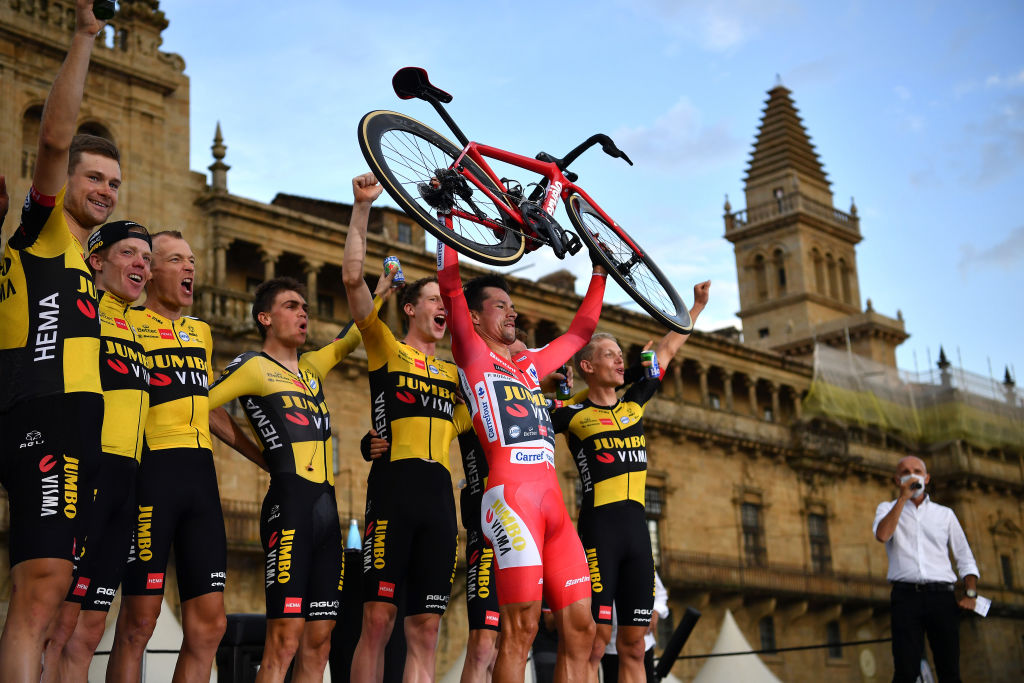
Get unlimited access to all of our coverage of the 2024 Vuelta a España - including breaking news and analysis reported by our journalists on the ground from every stage as it happens and more. Find out more.







